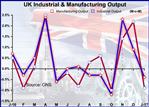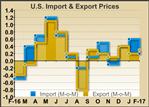UK industrial and construction output contracted in January, signaling a weak start to the year, though the declines were moderate after healthy gains in December.
Industrial production slid 0.4 percent in January from December, when it grew 0.9 percent, the Office for National Statistics reported Friday.
This was the first decrease in three months. Output was forecast to fall 0.5 percent.
The largest downward contributor was manufacturing, which shrank 0.9 percent, reversing a 2.2 percent rise in the previous month. Also, this was bigger than the expected fall of 0.7 percent.
The monthly decline in manufacturing was largely due to a decrease in pharmaceuticals, which slid 13.5 percent, partially offsetting the increase in transport equipment.
On a yearly basis, growth in industrial output eased to 3.2 percent in January, in line with expectations, from 4.3 percent in December.
Manufacturing output grew by a less-than-expected 2.7 percent annually, following a 4.2 percent rise in December. Economists had forecast a 2.9 percent increase.
Nonetheless, data showed that in the three months to January, total production climbed 1.9 percent, with manufacturing providing the largest contribution increasing by 2.1 percent, its strongest growth since May 2010.
Another report from the ONS showed that the construction output fell by 0.4 percent compared with December, when it climbed 1.8 percent. However, output grew on a three month-on-three month basis by 1.8 percent.
Overall annual construction output growth for 2016 increased to 2.4 percent from 1.5 percent, due to upward revisions for all four quarters.
After hefty rises at the end of last year, industrial and construction sectors still look on track to provide a 0.2 percentage point contribution to GDP growth in the first quarter, Ruth Gregory, a UK economist at Capital Economics, said.
In a separate communique, the ONS said the visible trade deficit remained broadly unchanged in January.
The deficit on trade in goods, dropped slightly to GBP 10.83 billion from GBP 10.91 billion in December. The deficit was expected to widen to GBP 11.1 billion.
Similarly, the balance of trade in services registered a surplus of GBP 8.87 billion compared to GBP 8.89 billion a month ago.
Consequently, the total trade deficit totaled GBP 1.97 billion, which was broadly unchanged from -GBP 2.03 billion in December.
Gregory at Capital Economics said trade figures point to more balanced growth.
All in all, not only do today's figures add to the evidence that economic growth has maintained a decent pace at the start of the year, but they also suggest that growth is starting to become better balanced, the economist noted.
IHS Markit economist Howard Archer said a key hope for the UK economy going forward is that the substantial overall weakening of the pound since the UK the June's referendum will increasingly feed through to boost foreign demand for UK goods and services.
by RTT Staff Writer
For comments and feedback: editorial@rttnews.com
Business News



